- Home
- slideshows
- miscellaneous
- All the atrocities Saudi Arabia committed before outrage over Jamal Khashoggi's death reached a fever pitch
All the atrocities Saudi Arabia committed before outrage over Jamal Khashoggi's death reached a fever pitch
Funding global terrorism

Restricting freedom of speech and independent media
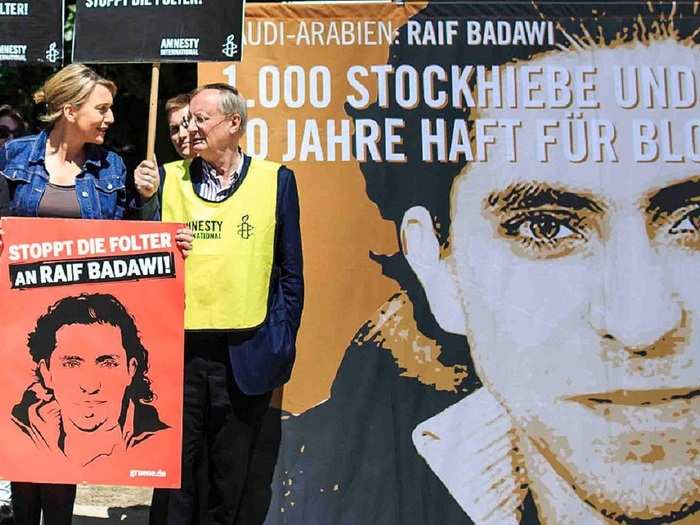
Saudi Arabia has consistently ranked low on press freedom indexes, and currently ranks 169th out of 180 countries in the 2018 World Press Freedom Index.
Saudi Arabia does not allow any independent media, and it attempts to censor its citizens online and offline.
Journalists there are subjected to scrutiny, and language deemed critical of the government can lead to detention under the country's counterterrorism laws. Journalists also face the threat of public punishment and even death.
In 2012, Saudi blogger Raif Badawi was charged with "violating Islamic values and propagating liberal thought," and sentenced to 10 years in prison, 1,000 lashes, and fined 1 million Riyals, which amounts to about $266,000, the US Commission on International Religious Freedom said.
In August, Saudi Arabia contemplated a death sentence for activist Israa al-Ghomgham, who documented political demonstrations in the country's Eastern Province.
She could face execution by sword, and her final hearing is set for October 28.
And the Saudi activist Omar Abdulaziz, a 27-year-old Canadian political refugee who hosts a satirical news show, told Business Insider in August that Saudi authorities arrested members of his family back home to pressure him into ending his program, which is often critical of the Saudi royal family.
Saudi agents even bugged his phone and tracked his movements in an effort to intimidate him.
Jailing human-rights activists
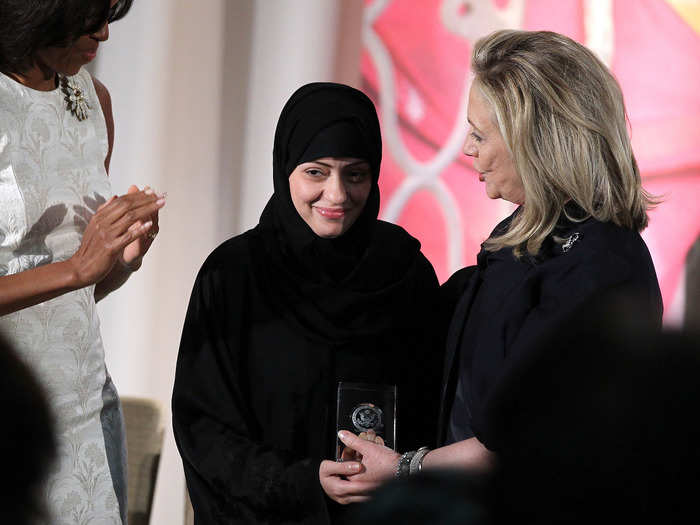
Saudi Arabia has been known to detain human-rights activists, sometimes without formally charging them with a crime. Some of these detentions are kept secret.
Earlier this year, Saudi Arabia arrested scores of activists — most of whom had campaigned ahead of an official rule change that allowed women to drive.
Some of the activists said the arrests were an attempt by Saudi leadership to stifle dissent and silence anyone who may seek to take credit for the Kingdom's decision to lift the ban.
The award-winning women's rights campaigner Samar Badawi was among those who were arrested. She is best-known for challenging the country's restrictive male guardianship laws, which prevent women from traveling, studying, or making important life choices without a man's permission.
Badawi is the sister of jailed activist Raif Badawi. She had previously been detained for her advocacy and was banned from traveling. Her arrest prompted a concerned tweet from Canada's foreign ministry, which asked Saudi Arabia to "immediately release" her and the other activists.
That move led to swift diplomatic retaliation from Saudi Arabia.
The Kingdom expelled Canada's ambassador. It froze new trade, suspended flights, recalled thousands of students, barred its citizens from receiving medical care in Canada, and began dumping Canada's assets.
Beheadings and public executions
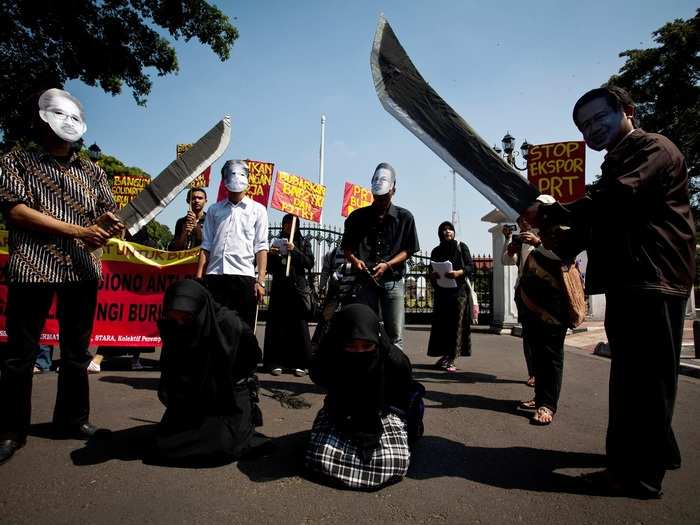
Saudi Arabia is governed by a monarchy. Its legal system is based on Islamic law, which enforces harsh punishment for criminal activity.
The death penalty can be applied for a wide range of offenses, including drug-smuggling, witchcraft, adultery, sodomy, and renouncing Islam. Capital punishment can be carried out by way of stoning, firing squad, beheading, or crucifixion.
Saudi Arabia is one of the only countries in the present day that permits crucifixion and beheading as a punishment.
In 2012, 17-year-old Ali Mohammed Baqir al-Nimr was arrested for participating in protests as part of the Arab Spring movement which spread to Saudi Arabia.
Al-Nimr was found guilty of encouraging pro-democracy protests using his phone, and was sentenced to death during a closed trial in which he said detainees were tortured in confessing to the crimes.
His uncle, Sheikh Nimr Baqr al-Nimr, who reportedly led anti-government protests, was publicly killed in a mass execution in 2016.
Saudi Arabia has also executed several foreign workers, a majority of whom came from Indonesia, prompting outcry from activists and organizations around the world.
According to Human Rights Watch, Saudi Arabia executed 48 people in the first half of 2018, half of them on nonviolent drug offenses.
Corporal punishment
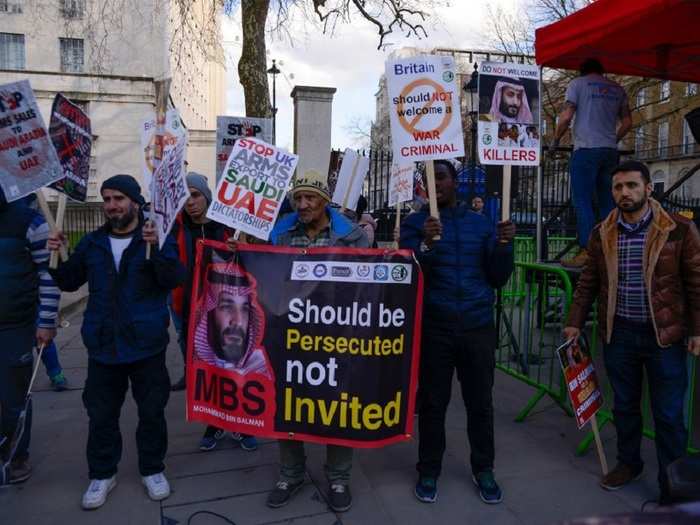
Saudi Arabia is one of several countries that still carry out legally sanctioned corporal punishment, which include caning, flogging, and body mutilation.
In 2009, a man named Mazen Abdul-Jawad, who went on TV to brag about his sex life, was sentenced to 1,000 lashes and five years in prison.
In August 2014, Karl Andree, a 74-year-old British man, was arrested in Saudi Arabia for alcohol possession. Alcohol is illegal in the Kingdom. Andree spent more than a year in prison before he was sent back to the UK in November 2015, according to the BBC.
In September 2018, Saudi Arabian prosecutors warned against publicly sharing satire on social media, which would subject violators to a fine of 3 million riyals (US$800,000) and five years in prison.
In 2014, Saudi authorities said a Yemeni man's hands were cut off after he was convicted of robbery. Such punishment is uncommon.
Turkish media reported that audio evidence indicated Jamal Khashoggi's fingers were cut off before his body was mutilated at the Saudi Consulate in Istanbul.
An unprecedented internal crackdown on corruption
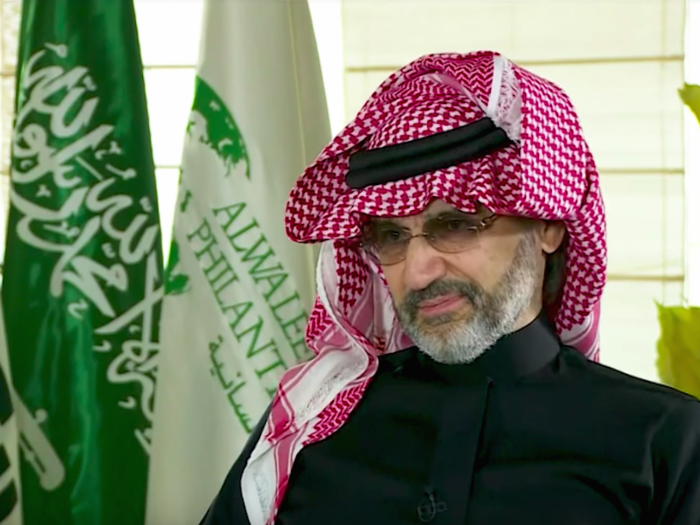
Since Crown Prince Mohammed bin Salman rise within the Saudi royal court began, he has slowly been consolidating his power by targeting those who pose a threat to his regime, sometimes by employing the use of coercion and torture.
In November, the Saudi government detained approximately 200 of the country's top government officials, businesspeople, and members of the royal family under the guise of corruption crackdown. They were held in the Ritz Carlton in Riyadh. According to a March 2018 New York Times report, some of the detainees were never informed of the charged for which they were being held.
According to the US State Department's report on Saudi human rights, security forces coerced some of the detainees "with relative impunity" — some of whom ultimately required medical care.
At least 17 officials were hospitalized in the early stages of the crackdown and one later died in custody after suffering major injuries from apparent mistreatment, The Times reported.
Family members of arrested officials said detainees were "deprived of sleep, roughed up and interrogated with their heads covered," according to the Times.
In several cases, the country's wealthiest were forced to hand over control of their businesses in exchange for their freedom.
Saudi prince Alwaleed bin Talal, who now owns a large stake in Snap, was one of the people detained in the crackdown. He was released two months later. He praised the crown prince's actions, but did not disclose details of the agreement he reached with the Saudi government.
The international community condemned Saudi Arabia's purported anti-corruption operation. All told, the crackdown produced more than $100 billion in settlements for the government.
Lebanese Prime Minister Saad Hariri held captive in Saudi Arabia
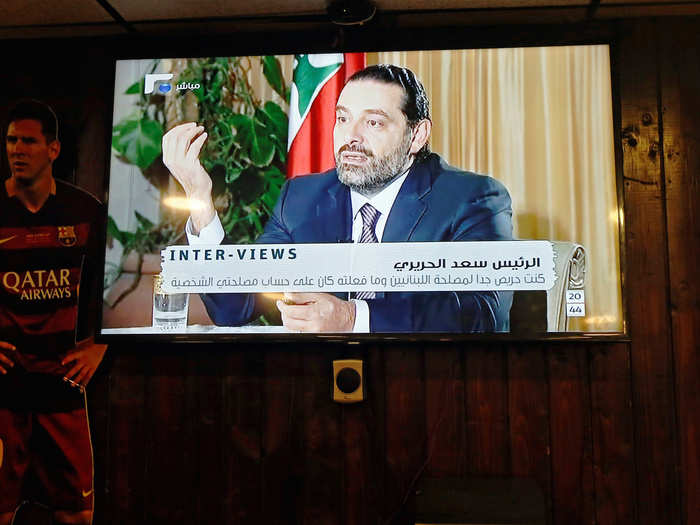
In November, Lebanese Prime Minister Saad Hariri unexpectedly announced his resignation during a trip to Saudi Arabia. The Kingdom is said to have also placed Hariri under house arrest, but the Saudis denied that, according to Reuters.
Hariri, a dual Lebanese-Saudi citizen, is politically supported by the Kingdom.
His resignation caught some people in the region off-guard. During his televised announcement,Hariri launched into a tirade, lambasting Iran and its militant proxy group Hezbollah which holds important seats in Hariri's joint government.
He also suggested that he feared for his life, and blasted the supposed hostile political climate in his country.
Multiple Lebanese sources, as well as two US officials, told Reuters that Saudi Arabia masterminded Hariri's resignation. The Lebanese sources also said that Saudi Arabia controlled his movements, and sources told The New York Times that Hariri was threatened with corruption charges if he did not cooperate.
Eventually, global diplomacy efforts produced a deal which allowed Hariri to leave. He later rescinded his resignation and vowed not to discuss details of what happened during his trip.
Publicly, Hariri has claimed that he acted freely in Riyadh, a message Saudi officials have been keen to tout, but many believe he was held in Riyadh against his will.
Saudi Arabia's role in the Yemeni civil war
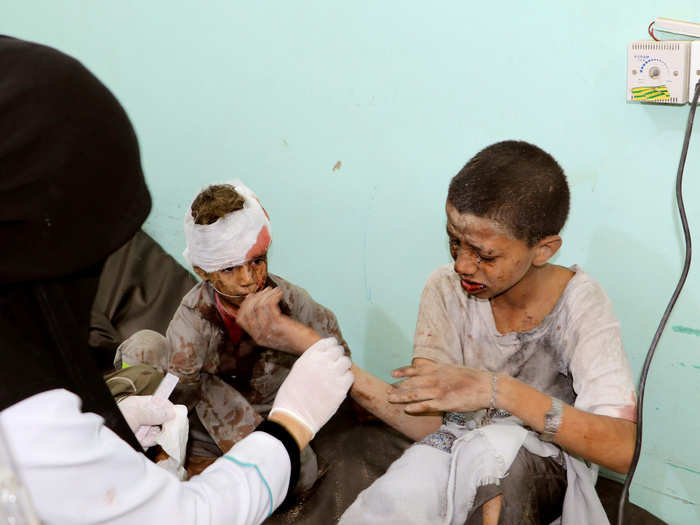
The civil war in Yemen has been raging since 2015, prompting one of the largest humanitarian crises in the world, and scores of children are at the center of it.
And while most have died from hunger and disease, many have been caught in the crossfire between the Saudi-backed Yemeni government and Iranian-backed rebel militant Houthis in what experts view as a proxy war over regional power between the bitter rivals.
Saudi Arabia launched a military intervention in Yemen in 2015, leading a coalition of nine African and Middle East countries to intervene and back Yemen's President Abed Rabbo Mansour Hadi.
The coalition has launched hundreds of air strikes targeting Houthi strongholds and implemented a naval blockade, limiting resources and aid to Yemen where it is nearly impossible for food, water and fuel to pass through.
But beyond the perils of war, Saudi Arabia has been accused of war crimes that have deeply worsened the humanitarian crisis.
In August, Human Rights Watch published a report documenting atrocities in Yemen which include at least 10 indiscriminate Saudi-led coalition airstrikes.
The United Nations Office of the High Commissioner for Human Rights (OHCHR) found that 6,592 civilians have been killed since the start of the war and around 10,470 civilians have been wounded, mainly by airstrikes led by Saudi forces.
HRW's investigation into the strikes found several apparent violations of war where Saudi forces fired at either no apparent military target, or failed to distinguish between civilians and enemy positions.
Saudi airstrikes reportedly killed at least 20 members of a wedding party in April. More than 40 children were killed when a Saudi-led coalition airstrike hit a school bus that month, which Saudi Arabia later admitted was unjustified.
Popular Right Now
Popular Keywords
Advertisement